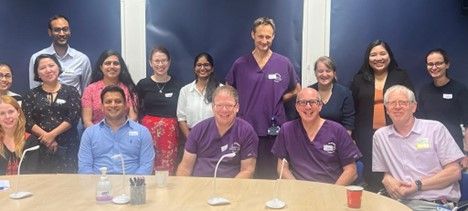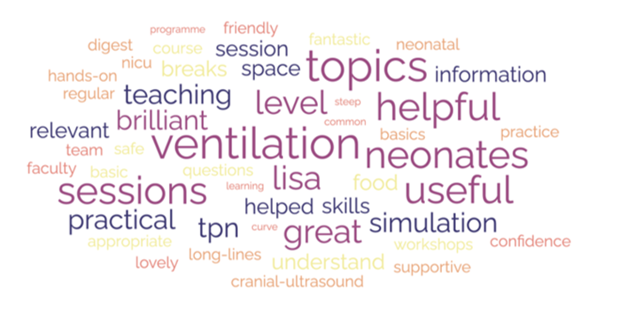By Dr Arameh Aghababaie
Arameh and Alex are London paediatric trainees who both had a shared vision of making neonatal medicine less daunting for new trainees entering a neonatal intensive care environment. With relatively fewer neonatal courses in London compared with other deaneries, they teamed up with Dr Sandeep Shetty (Consultant Neonatologist at St George’s University Hospital), and set up their own pan-London neonatal crash course for ST1 paediatric trainees. Read about their journey in getting this project off the ground.
Neonatal intensive care units (NICU) are a very high-intensity environment with high levels of acuity and activity. And unfortunately, neonatal medicine is not necessarily focused on within the medical school curriculum, and there are very few NICU foundation rotations. Therefore, for paediatric trainees entering this environment, especially for the first time, we can often feel underprepared and overwhelmed. Changing rotations every 6 months also adds an additional complexity. You come to a new unit, and in your first week, in a matter of days, you are orientated to a new department, staff, equipment, protocols, and some logins (which usually don’t work immediately). Then, you’re released into the wild, and you’re basically just trying to survive through the next 6 months. Unfortunately, this is not always the most conducive environment for learning.
As a remedy for that, I would search high and low for neonatal study days to attend in London, but I found them very difficult to come by, and not as easily accessible. So I would often travel outside of London to other regions where they had such study days on offer. As I progressed through training, I thought to myself that it would be great if I could take what I have learned on the job, and from various external regional neonatal study days I’ve attended, and set up my own ‘neonatal crash course’ in London.
So in September 2021, I approached the London School of Paediatrics (LSP) with this idea, and they put me in touch with Alex. Alex is another paediatric trainee, who also had the same idea and vision as me, and coincidentally approached the LSP at the same time as I had. The LSP did not have the funding to run a new course at the time, but suggested we can run a free virtual course together.
Alex and I then set up our first virtual course pilot, entitled “Virtual Neonatal Crash Course” in March 2022 (just after paediatric trainees changeover rotations). These were 1 hour online lectures on the basics of four core topics of neonatology (ventilation, circulation, neurology, and nutrition), spanned over 4 weeks, and open to all. We had over 400 attendees at these courses, spanning across the UK and beyond, to various international countries. The virtual course was later published on the LSP Youtube Channel for all to access, which has collectively racked up almost 3000 views. Our attendees gave us overwhelmingly positive feedback, and there was a huge demand for us to develop a subsequent face-to-face course.
Therefore, following our success, Alex and I reached out to the LSP to explore whether we can develop a face-to-face course. Following several meetings with various different people, we received some constructive feedback and lots of homework to do. Despite working on this, it was still quite challenging to secure the funding for a face-to-face course, and to convince people that our idea was worth investing in.
Through this process, we met Dr Katharine Jamieson (Consultant Neonatologist, Neonatal Transfer Service), who at the time was working with the London Simulation Network, and Dr Cally Tan (Consultant Neonatologist, University College London Hospital) who also founded her own neonatal course in London (‘A Survival Guide to Neonatal Intensive Care’). They were a huge beacon of support and advice, and really advocated for us and our vision.
In the interim, Alex and I collated and analysed the feedback from our virtual course pilot, and presented this as a poster at the PIER (paediatric innovation, education, and research) conference, and published this as a paper in the Postgraduate Medical Journal.
With the increasing exposure of the success of our virtual course pilot, and with Dr Jamieson and Dr Tann’s support (and with some luck and good timing!), we secured HEE funding in early 2023. Alex and I were absolutely thrilled, and very thankful to the LSP, Dr Jamieson and Dr Tann for facilitating this. But the real hard work was to begin.
They gave us a lot of their wisdom and streamlined a lot of our ideas. We were also advised to include a consultant neonatologist with a background in education to support us. So, we reached out to Dr Sandeep Shetty (Consultant Neonatologist, St George’s University Hospital). Dr Shetty taught the ‘ventilation’ lecture on our virtual course pilot, and has vast experience with teaching and hosting study days. He was also planning to set up a similar course to ours. Therefore it only felt natural to add Dr Shetty to our team, and he kindly accepted our invitation.
From then on, for the next 6 months ahead, Dr Shetty, Alex, and I, embarked on this adventure together – to curate a pan-London study day for paediatric trainees, on the basics of neonatology, based on the foundation of our virtual course pilot and the feedback we received from this.
We first secured GAPS (St George’s Simulation Centre) as our venue, with the support of their excellent simulation education specialists, and their state-of-the-art space and facilities. We then secured a date (which we wanted shortly after the rotation changeover). We then built a programme, still based on the basics of the four core topics covered in our virtual course, but delivered in an interactive workshop format, and simulation scenarios. We were also incredibly lucky to secure an absolutely fabulous multidisciplinary faculty (pictured below – primarily from St George’s NICU) to bring our workshops to life.

This was no easy task, and it required a lot of meticulous planning, and many meetings!
The registration link then went live, and we sold all 28 tickets in 30 minutes. We eventually had to hone the attendee list to solely ST1 paediatric trainees to ensure we can target more specific learning needs and create an even playing field and safe learning environment. Once the attendee list was sorted, it suddenly felt very real and there was no going back. We were even more motivated to make this the most enriching neonatal study day as possible for our trainees.
Then the actual day came. 29th September 2023. And it felt like all of our fruits of labour over the past 2 years were finally playing out and came to life – it was totally surreal! Dr Jamieson also came to support us on the day, and it felt like a full circle moment. And yes, despite planning all minute details and creating hypothetical solutions for all potential eventualities on the day, there were a few curveballs and minor unexpected issues that needed quick ironing out. However, I think we can say that overall the day was a total success and I’m really proud of all of us for what we’ve achieved! We had an outpouring of positive feedback from the faculty and attendees (see our wordcloud below from their written feedback). And we had a demand for more courses! And for an additional ST3/ST4 study day!

Overall, what would we say we learned from this process? If you have an original idea, run with it. Persistence is key. But don’t be disheartened by rejection. Listen to all the feedback you receive, and use it as an opportunity to develop your idea further. But don’t change the core vision of what you wanted to achieve. Having someone who supports your vision along the way is also key. So we’d like to thank the LSP, and Dr Jamieson and Dr Tann for doing just that for us. And a huge thank you to all the faculty who supported us with the virtual course and the face-to-face course. We would also like to thank GAPS for their facilities and expertise in making our course extra special for the attendees. And a special thanks to my co-pilots, Dr Shetty and Alex. We all bring different things to the table, and I think we orchestrated something wonderful together. Setting up a course can be a long and arduous process. It took us 2 years. And we are still hoping to develop this as a regular face-to-face course, and later on creating a framework so that all regions can run our study day for their local trainees. Therefore, our work is certainly not done. But we are hopefully on the right track. Watch this space.
By Dr Arameh Aghababaie